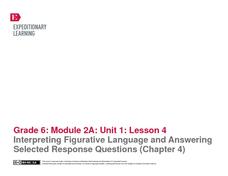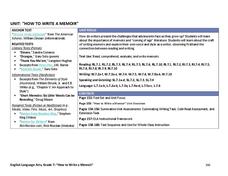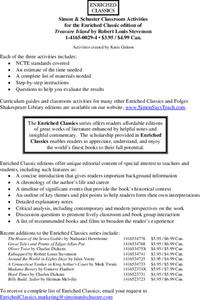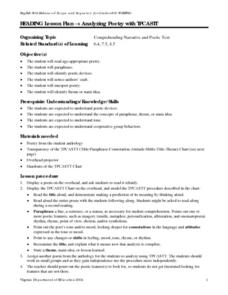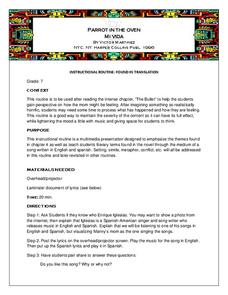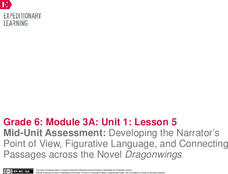EngageNY
Figurative Language and Word Choice: A Closer Look at Bud, Not Buddy (Chapter 2)
The difference between an average and an unforgettable writing can lie in the author's word choice. The figurative language in Chapter 2 of Christopher Paul Curtis's Newbery Medal Winner, Bud, Not Buddy, is the focus of a series of...
National Endowment for the Humanities
Jacob Lawrence's Migration Series: Removing the Mask
Describe, analyze, compare and contrast poets from the Harlem Renaissance. Critical thinkers analyze the imagery, characterization, tone, symbolism, and historical context of Jacob Lawrence, Helene Johnson, and Paul Laurence Dunbar. A...
Activated Story Theatre
Orpheus- A Greek Myth: Reader's Theatre Script
Is this any way to treat a Greek Myth? By all means, turn the tale of Orpheus into a reader's theatre exercise.
EngageNY
Interpreting Figurative Language and Answering Selected Response Questions (Chapter 4)
To prepare for an assessment of how well individuals are progressing with their ability to identify and analyze figurative language and its effect on tone and meaning, pairs work through Chapter Four of Christopher Paul Curtis'...
Louisiana Department of Education
How to Write a Memoir
Who are we and what shapes our identities? Seventh graders work to answer this question as they learn how to write a memoir. Full of non-print resources and supplemental texts that range from fiction to non-fiction, scholars write their...
Simon & Schuster
Classroom Activities for Treasure Island by Robert Louis Stevenson
Readers take part in three activities after reading Robert Louis Stevenson's Treasure Island. To understand the importance of diction, class members analyze Stevenson's characters' language to denote their social status. After completing...
Curated OER
Analyzing Poetry with TPCASTT
Middle schoolers read a poem and complete a TPCASTT chart. They make a prediction about the title (T) , paraphrase each line (P), identify poetic devices and nuances (C-connotation), explore mood and tone (A-attitude), point out shifts...
Curated OER
Parrot in the Oven: Instructional Routine
After reading "The Bullet," a particularly intense chapter in Victor Martinez's Parrot in the Oven: Mi Vida, class members listen to the Spanish and the English versions of "Dimelo" by Enrique Iglesias. They then discuss how the song...
Winterhill School
Poetry Analysis
Gain greater insight into poems using a poetry analysis worksheet. Here, scholars follow steps and answer questions to dissect any poem. Topics include the poem's meaning, theme, technique, and structure, as well as personal thoughts and...
Curated OER
What's that Mammal?
Learning by example is always effective if it's paired with independent practice opportunities! Model good reading practices for your class. Learners listen to the teacher model examples of reading with voice, expression, and tone...
EngageNY
End of Unit 1 Assessment: Analyzing an Excerpt from Barack Obama’s Back-to-School Speech
In order to assess their mastery of the concepts taught in a 12-lesson plan unit study of Christopher Paul Curtis' Bud, Not Buddy, individuals read excerpts from President Barack Obama's 2009 Back-to-School Speech and use the strategies...
Curated OER
Laurence Yep's Dragonwings
Students read independently the novel, "Dragonwings," by Laurence Yep and make connections between a text and the world. They summarize, paraphrase, analyze and evaluate skimming and scanning techniques when reading a novel. Each student...
Curated OER
"Declaration (of a Kgomotso Girl)"
Students explore the poem, "Declaration." Students discuss how elements of poetry such as tone work to convey meaning. Students compare and contrast their lives and the lives of the poem's characters from South Africa.
Roy Rosenzweig Center for History and New Media
War and Poetry
A band of brothers or the Devil's agents? Nobel warriors freeing the oppressed or mercenaries working for the military/industrial complex? Groups examine poems from the Civil War, World War I, and World War II to determine the poets'...
Curated OER
Irony
You will want to listen to the famous song, "Ironic," by Alani Morissette, after viewing this short PowerPoint. The three slides in this slideshow include a definition of irony, verbal irony, and dramatic irony. Tip: Ask your class to...
Novelinks
The Little Prince: Concept/Vocab Analysis
Focus on the literary elements of Antoine de Saint-Exupéry's The Little Prince with a concept analysis sheet. With suggestions and explanations for many of the book's concepts, vocabulary, and other issues that may arise in instruction,...
EngageNY
Mid-Unit Assessment: Developing the Narrator’s Point of View, Figurative Language, and Connecting Passages across the Novel Dragonwings
Let's get creative! As part of a mid-unit assessment, scholars create a piece of artwork illustrating the theme from Laurence Yep's novel, Dragonwings. Additionally, pupils use a graphic organizer to identify figurative language in the...
Simon & Schuster
Curriculum Guide to: Adventures of Huckleberry Finn by Mark Twain
Five lessons make up a curriculum guide to The Adventures of Huckleberry Finn. Readers find examples of Twain's use of irony, closely examine Huck's colloquial language, as well as his sense of morality, and identify themes in the novel....
Academy of American Poets
Teach This Poem: "On Being Brought from Africa to America" by Phillis Wheatley
Phillis Wheatley's poem, "On Being Brought from Africa to America" is the focus of a lesson that asks readers to consider how the poem is a critique of slavery. Groups comprise a list of words and phrases they notice as well as questions...
Academy of American Poets
Teach This Poem: "Old South Meeting House" by January Gill O'Neil
The vaulted ceiling of the Old South Meeting House has heard many voices. Young scholars read an excerpt about its importance in American history and then do a close reading January Gill O'Neil's poem, "Old South Meeting House." After...
ReadWriteThink
What is Poetry? Contrasting Poetry and Prose
Introduce middle schoolers to the different strategies used when reading prose versus poetry. Groups use a Venn diagram and a poetry analysis handout to compare the characteristics of an informational text and a poem on the same subject...
Curated OER
Come On, Rain!
Students read and analyze the story. In this language arts instructional activity, students read Come on, Rain! and examine how mood and tone are created, the use of figurative language and the characteristics of the genre. Students...
K12 Reader
Literature About Chicago: Prose vs. Poetry
For this comprehension exercise, readers compare Carl Sandburg's "Chicago" to a description of the city from Upton's Sinclair's The Jungle.
Curated OER
The Rumpelstiltskin Story
Why didn't Rapunzel's hair stop growing? Why did it take the fairy godmother so long to intervene in Cinderella's affairs? Young writers consider unanswered questions like these and compose news articles investigating the true story...
Other popular searches
- Mood and Tone
- Mood and Tone Worksheet
- Tone Mood
- Teaching Mood and Tone
- Author's Tone and Mood
- Analyzing Tone and Mood
- Author's Tone
- Tone and Mood Powerpoint
- Frost Poetry Tone
- Literary Elements Tone
- Voice, Tone, Audience
- Tone of Voice





